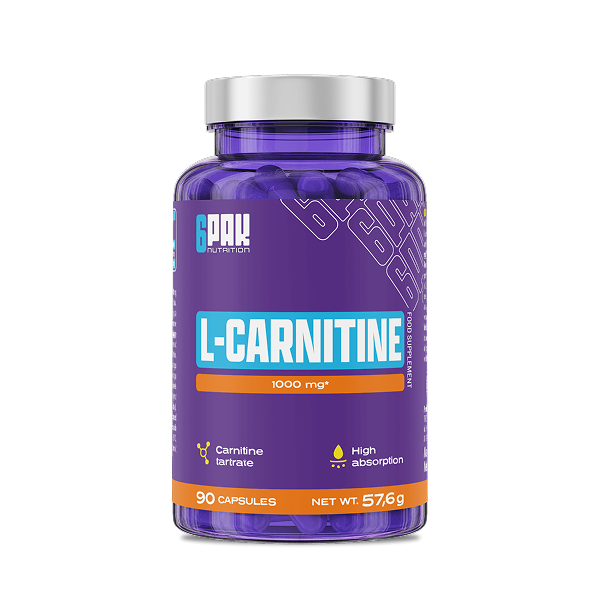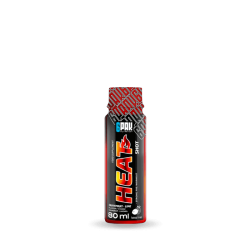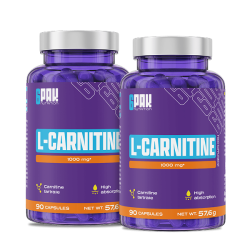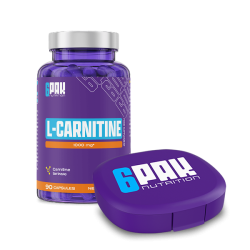Przedtreningówka + Spalacz tłuszczu Heat Shot - 80ml
L-karnityna odgrywa rolę w utlenianiu kwasów tłuszczowych (to ważne źródło energii dla pracujących mięśni), przez co jest znana jako potencjalna pomoc ergogeniczna wśród osób aktywnych fizycznie.
L-Carnitine - 90 kaps.

Bezpieczne zakupy SSL

Wysyłka w poniedziałek!

Załóż konto i zyskaj cashback 10zł za pierwsze zamówienie +5% od wartości każdego produktu
Nasza propozycja przypadnie do gustu wszystkim, którzy są aktywni fizycznie i chcą uzupełnić swoją dietę o L-karnitynę. Bezproblemowa suplementacja to jest to, co cenimy wszyscy najbardziej. L-karnityna w wygodnej postaci kapsułek, czyli Effective Line L-carnitine to będzie idealny wybór!
A czym właściwie jest L-karnityna?
Karnityna stanowi pochodną aminokwasu i mikroskładnik odżywczy, który odgrywa kluczową rolę w metabolizmie pośrednim, którego główną funkcją jest udział w transporcie długołańcuchowych kwasów tłuszczowych do macierzy mitochondrialnej, gdzie zachodzi utlenianie kwasów tłuszczowych. Inne zadania karnityny to m. in. zachowanie integralności błony oraz zmniejszenie produkcji mleczanu. Mięśnie ludzkie zawierają duże ilości karnityny, ale zależy to od wychwytu tego związku z krwiobiegu, ze względu na niezdolność mięśni do syntezy karnityny. Mitochondrialne utlenianie kwasów tłuszczowych stanowi ważne źródło energii dla metabolizmu mięśni, szczególnie podczas wysiłku fizycznego1.
Skąd się bierze L-karnityna w naszym ciele?
Nasz organizm pozyskuje karnitynę głównie z diety, przede wszystkim z produktów żywnościowych pochodzenia zwierzęcego, takich jak czerwone mięso, kurczaki, ryby i nabiał. Tylko 25% karnityny pochodzi z syntezy endogennej. Biosynteza karnityny wymaga dwóch niezbędnych aminokwasów: L-lizyny oraz L-metioniny. Szacuje się, że całkowita zawartość karnityny w organizmie człowieka wynosi około 300 mg/kg, z czego około 95% jest magazynowana wewnątrzkomórkowo w sercu i mięśniach szkieletowych, a pozostała część w wątrobie, nerkach i osoczu. Ilość krążącej karnityny w osoczu stanowi jedynie 0,5% całkowitej karnityny w organizmie. Mówiąc inaczej, wśród różnych tkanek obwodowych prawdopodobnie głównym celem transportu karnityny są mięśnie. Około 90–95% całkowitej karnityny koncentruje się w mięśniach, a stosunek stężenia karnityny w mięśniach do stężenia w osoczu wynosi około 50:11.
Po co stosujemy L-karnitynę?
L-karnityna jest stosowana jako suplement diety przez osoby aktywne fizycznie rekreacyjnie, ale też sportowców wyczynowo i wysoko wytrenowanych. Główną funkcją L-karnityny jest transport długołańcuchowych kwasów tłuszczowych do macierzy mitochondrialnej w celu ich przekształcenia w energię. L-karnityna uczestniczy też w regulacji szlaków metabolicznych, które mają znaczenie w równowadze białek mięśni szkieletowych (chodzi o proteolizę i syntezę białek)2. Stosowanie L-karnityny jest popularne jako środek wspomagający ergogenię, a głównym założeniem jest to, że zwiększenie zawartości karnityny w mięśniach zwiększy utlenianie tłuszczu w mięśniach i opóźni ubytek glikogenu w mięśniach3. Panuje przekonanie (na co oczywiście istnieją dowody naukowe), że L-karnityna odgrywa istotną rolę w zwiększaniu wytrzymałości i regeneracji po zmęczeniu4.
Literatura:
- Gnoni A., Longo S., Gnoni G. V., Giudetti A. M., Carnitine in Human Muscle Bioenergetics: Can Carnitine Supplementation Improve Physical Exercise? Molecules, 2020, Jan 1;25(1):182.
- Sawicka A. K., Renzi G., Olek R. A., The bright and the dark sides of L-carnitine supplementation: a systematic review, Journal of the International Society of Sports Nutrition, 2020, 17, 49.
- Wall B. T., Stephens F. B., Constantin-Teodosiu D, Marimuthu K, Macdonald IA, Greenhaff PL. Chronic oral ingestion of L-carnitine and carbohydrate increases muscle carnitine content and alters muscle fuel metabolism during exercise in humans. The Journal of Physiology, 2011, Feb 15;589(Pt 4):963-73.
- Vecchio M., Chiaramonte R., Testa G., Pavone V., Clinical Effects of L-Carnitine Supplementation on Physical Performance in Healthy Subjects, the Key to Success in Rehabilitation: A Systematic Review and Meta-Analysis from the Rehabilitation Point of View. Journal of Functional Morphology and Kinesiology, 2021, Nov 4;6(4):93.
| Porcja: | 2 kaps. |
| Ilość porcji w opakowaniu: | 45 |
| Opakowanie: | 90 kaps. |
| Masa netto: | 57.60 g |
| Wartość odżywcza / Informacja żywieniowa | ||
| na 2 kaps. | % RWS* | |
| Winian L-karnityny | 1000 mg | - |
| - w tym L-karnityna | 680 mg | - |
*RWS - Referencyjna wartość spożycia.
Składniki: 78,1% winian L-karnityny, otoczka kapsułki [substancja glazurująca (hydroksypropylometyloceluloza)], substancja przeciwzbrylająca (sole magnezowe kwasów tłuszczowych).
Produkt może zawierać: mleko, soję, zboża zawierające gluten, ryby, mięczaki i orzeszki ziemne.
L-carnitine
Suplement diety w postaci kapsułek zawierający 1000 mg winianu L-karnityny w porcji produktu zalecanej do spożycia w ciągu dnia.
Sposób użycia
Przyjmować 2 kapsułki dziennie, nie rozgryzając, popijając odpowiednią ilością płynu, najlepiej na 30 min. przed posiłkiem lub treningiem.
Ostrzeżenia
Nie stosować w przypadku uczulenia na którykolwiek ze składników produktu. Produkt nie może być stosowany jako substytut zróżnicowanej diety. Nie stosować u dzieci, kobiet w ciąży i w trakcie laktacji. Zrównoważona dieta i zdrowy tryb życia są ważne.
Sposób przechowywania
Przechowywać w suchym miejscu, w temp. 15-25°C, w zamkniętym opakowaniu, w sposób niedostępny dla małych dzieci. Chronić od światła i wilgoci. Po otwarciu spożyć w ciągu 3 miesięcy.
Producent
TREC NUTRITION Sp. z o.o., ul. inż. J. Śmidowicza 48, 81-127 Gdynia, POLAND
Jeżeli masz zastrzeżenia do opini, napisz na [email protected].













Jeżeli masz zastrzeżenia do opini, napisz na [email protected].